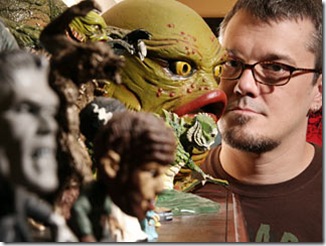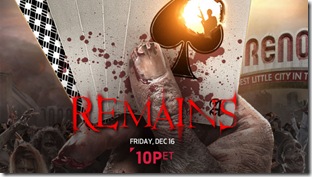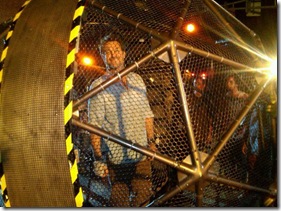This evening Chiller presents its first original movie, Steve Niles’ Remains [10/9C] which takes an intriguing, fun and, yes, chilling look at the whole idea of a zombie apocalypse.
Earlier this week, Niles took the time to chat with a number of bloggers/journalists about his first foray into the realm of the TV-movie; shared his choice for favorite horror movie monster; took us back to the glory days of TV-movies [Night Stalker, anyone?], and found time to praise the efforts of Remains stars Grant Bowler and Evalena Marie.
Hi. Thanks so much for being on this call. The trailer for the movie looks terrific. I’m really looking forward to seeing the movie. Were you involved in this production beyond creating the source material?
Steve Niles: You know they kept me very close to it. Basically, you know, I guess the best way to, you know, call my role was, you know, I supervised a lot. They – you know they ran the script by me and – you know, and I did set visits and I – you know I was in constant contact with the folks at Chiller and Synthetic and they kept me involved at every stage of approving makeup and, you know like I said, the script.
But, you know, part of it was is these guys really knew what they were doing and – you know I felt perfectly comfortable, you know, being on the coast while they we working on it, you know? But, they kept me involved quite a bit and I really appreciate that.
Oh, that’s great. Now, so as an author what do you look for when you’re approached by someone who wants to turn a graphic novel of yours into a movie or a series?
Niles: Honestly, enthusiasm. You know, enthusiasm for the material means more to me than, you know, a big option. You know, I had this happen – you know, I – it’s even a – kind of a good example is what happened with 30 Days of Night. When we were selling 30 Days of Night it turned into a bidding war and we had to choose between (unintelligible) was which one was (unintelligible)…
Oh, yeah. So yeah, the bidding war for 30 Days of Night is the perfect example of, you know, what – the thing was I was really didn’t care. There were three studios bidding, they all had a lot of money, but I went with the one that had Sam Raimi, you know, attached to it because I know Sam knows horror, and that was very similar with the guys from Remains. Andrew reached out to me from Synthetic Cinema and, you know, he was very upfront about it. You know, he was like, you know, “We’re a small company and we’re – you know we’ve just done these things, but we really love this material,” and he understood remains too, which is – you know was really important to me.
And he didn’t – you know, because a lot of times what happens in Hollywood is people will come to you and say, “Oh my, God, I love your book. Let me tell you our take on it.” It’s like, “But, the book is the take.” And – you know and that didn’t happen with Chiller and with Synthetic Cinema. They wanted to do the comic book, you know? They wanted to capture the spirit of it and, you know, that’s shockingly rare. So, their enthusiasm is what really got my attention.
Well, I want to ask you about zombies and why you think they’re so popular. You know I love them, but I – what do you think it is about it right now? Why are they so amazing?
Niles: I think – you know I think horror always reflects, you know, our general fears and anxieties of – in society. And right now, without getting too serious, you know, right now we’re actually afraid of other people. We’re afraid of disease, we’re afraid of being invaded by people who look kind of like us, so you know the way we sort of express those fears are through what better than this mindless zombie hoard that wants to eat us. You know, these – our neighbors. I mean they are, they’re our friends and neighbors who want to kill us and eat us.
So, I think it’s – you know, I think zombies are a very, very basic way for us to confront those fears too, because the reality of it, you know, it’s the real world stuff is so horrifying and zombies are a great way for us to sort of work through those fears, and that’s just something I feel about horror in general. You know, I always feel like it’s a relief and we use it to you know, like I said, to illustrate what we’re afraid of, and then shoot it in the head, you know?
Does that make sense?
Totally, yeah, totally. And I have to ask you quickly just because, you know, I love this stuff, Paradise Lost, where are you guys on that right now?
Niles: I’m writing a script that I’m pretty sure I’m going to have to go into protective custody when the artist reads it, because if you’ve ever read Paradise Lost there isn’t – once the war starts everything is in the millions. So, for the first time in my life I’m writing a comic book and I’m literally going like, I am so sorry, but a million angels come swirling down.
But, I’m having – I’m really having a lot of fun with it. You know, it’s – I’m working from Alex Proyas’s script, so you know not the poem. If I was working from the poem I would not sound nearly as chipper. But, I – you know Alex Proyas wrote this incredible script and that’s what I’m adapting. And he really figured out a way to strip it down to the basic story where you’re dealing with basically, you know, the story of Lucifer and his relationship to the Arc Angels and how the whole division started, and I’m really having fun. I think it’s going to be – you know, and then Michael Kaluta is doing the art, so if he doesn’t kill me it’s going to be a beautiful book.
I just wanted to know, how does it feel to have the first original movie on Chiller?
Niles: You know this is really exciting for me because I really like TV movies. I grew up with TV movies. Dan – you know, I don’t even know is this name will mean anything to anybody on this call, but Dan Curtis, a hero of mine, you know he wrote – you know he did the show the Night Stalker shows and Dark Shadows, and I mean he was behind so much of these great things and he used to do all these great TV movies.
And also, it used to be Richard Matheson used to write tons of ABC Movies of the Week during the 70s and they’re these really wonderful, you know, pretty much exactly this kind of stuff. They were Richard Matheson short stories turned into movies for TV, so I just have this – a really special affection.
And I remember when they called I could tell there was – everybody sort of like apologetic, “Do you want to do a TV movie?” And I was – I’m thrilled, you know, I’m thrilled with it because, you know, just Night Stalker being one of my favorite TV movies of all time, you know? So, I remember when I got together with these guys, you know, I started talking to them about these TV movies and, you know, sort of got them in the spirit of it.
So, you know, I’m thrilled and then Chiller has wound up being just – you know, they’re already, you know, like my family. They’ve been so great in keeping me informed. (Shane) and (Tom) and everybody has just welcomed me, you know, into the Chiller family, and they’ve been – it’s just been wonderful, and I cannot say enough about the promotion on this. You know, it’s hard for me to even watch Chiller right now because I get sick of seeing my name all over the place.
So, I’m really excited. I’m really – and – you know and I’m excited about the movie too, because I think it really came out fun.
Excellent. Good to hear. Well, hopefully that means we’ll see more of your stuff in the future.
Niles: I – you know, let’s just say there are talks. We are talking.
Hey, good to know.
Niles: Yeah.
One more quick thing, Steve, and I’ll let you go. I wanted to know, what are you more partial to, vampires or zombies?
Niles: That’s a tough one. I have to go with vampires and let me qualify that. The – my kind of vampires.
Okay.
Niles: Mean, nasty vampires that don’t want to seduce you; they want to take your blood. I just – you know, I have a – I’ve been writing them for a long time, I’ve developed an affection for them, and as a writer there’s slightly more you can do with that particular monster. Zombie stories are great for telling stories about humans, oddly enough, while vampires are great for telling stories about vampires because they are technically still human and have brains and lives and emotions, and things like that that you can play with. So, I’d have to go with vampires.
I’ve got to ask, you know, because I think what needs to be brought up, I mean for those who haven’t read the Remains graphic novels is what separates the Remains zombies from anything else that we’ve seen?
Niles: Well, really, I mean that’s a big thing I wanted to bring up – or I want to talk about too, because I know a lot of people right now, you know, Walking Dead is, you know, so popular and, you know, that’s sort of the current version of, you know, what people think you know zombies are.
When I sat down to write Remains, you’ll – you remember this, it was, you know, the time when Walking Dead was, you know, just starting to get strong as a comic, Land of the Dead was out. There was just sort of – there was a zombie surge building. And when I sat down to do Remains I wanted to do something different, and I wanted to do something that, you know, was a little bit bigger than the – you know do they run or do they shamble?
And for that it seemed it like I had to come up with something that could put the audience and the characters on edge, because let’s face it, now especially, everybody knows how to deal with zombies, you know? You board up in the house and you wait it out. You shoot them as they come to you, you know? But, in Remains that doesn’t necessarily work because of the event that creates these zombies there’s actually two different kinds.
And one of them was slightly more advanced and they’re eating the others and they’re evolving, and there’s – so you can’t – in Remains you can never sit back in your boarded up house and be comfortable, because the zombies will sooner or later figure out how to either climb in or pull the boards off, so I had a lot of fun with that.
I had a lot of fun playing with zombie conventions, you know because, you know, there’s not just the Walking Dead zombies, there’s the George Romero zombies, the (Folchi) zombies, there’s the Return of the Living Dead zombies, there’s the remake of Dawn of the Dead zombies, and I really tried to kind of have fun with all of them, you know?
Yeah.
Niles: And that’s a – you know because that’s another thing and it’s just a pet peeve of mine with any genre movie is it bugs when anything is all the same. Like when, you know the Star Trek planet where everybody has blonde bowl cuts. I’m like, “How did that happen,” you know? Now, so I like – so I figure in a world where zombies are created, you know, and especially in Remains, is because of the human accident that there would be variations of the disease of the – based on the proximity to what happened.
Did that make sense?
Yeah. That totally made sense. And I need to ask you real quick, you had mentioned on Twitter that somebody approached you about a stage production of one of your properties. What was it?
Niles: Yeah, well, I – you know, I’ll tell you what, I can’t say which property yet because I want to – I haven’t actually met with them. We want to make sure it’s possible. But, what I can say is it’s going to be one of mine and Bernie Wrightson’s, so essentially what we’re going to try to do is do a live Bernie Wrightson comic. And Bernie will – Bernie wants to paint the sets, so…
That’s awesome.
Niles: …I’m – you know I’m going to have a problem now with – the backdrops are going to be original Bernie Wrightson art and I’m going to have to like – you know they’re going to be more valuable than anything. So, what we’re going to try to do is do a stage – a live comic on stage.
I want to find out maybe if you could perhaps tell us what were some of the biggest production challenges, you would say, bringing the Remains comic book in front of the camera and then on to the small screen would you say?
Niles: Well, the biggest thing is, and this, you know I run into this a lot with – when I – with comic books to movies. In a comic book you have no budget. I can do anything I want. If I want 10,000, you know, bikers, you know, coming out of the horizon, you know, I can do that. The artist will be mad at me, but you know it’s not a budget issue.
So, the first thing we had to do was go through the comic and there were a few set pieces that would have just been impossible, and if – people who read the comic there is a biker scene in there that it just would have cost too much money because it literally is hundreds and hundreds of bikers approaching through the desert not realizing that they’re about to hit an entire system of wires…
Oh, geez.
Niles: …and so they all get sliced like a – you know, like deli sandwiches, you know, as the ride into the city. The budget to shoot that was just way over the top, so we had to come up with other ways to do it.
I’m really happy with – you know, Synthetic Cinema, you know, because we – the budget, you know, was a TV movie budget, I am absolutely shocked at how much of the comic is – that they actually got on film, you know? They did such a good job of figuring out a way around, you know, all the – you know, there’s a – I don’t want to give too much away, but there’s a scene involving a circus prop for a sort of Cirque du Soleil-type casino, I assumed that that would just be cut because it’s so over the top and so silly, and they found a way to do it. And not only did they found a way to do it so that it’s really effective. So, I – you know I’ve been really happy with this. I have always been a fan of, you know, low budget – you know low budget horror. I – as a matter of fact, I think, you know, in the history of horror most of our best films, you know, started with, you know, kids with not much money trying to figure out a way to make the best movie possible. And you know, I will point to the greatest zombie movie of all time, which is Night of the Living Dead.
Yeah.
Niles: It was shot for what, $70,000 on the weekends, you know, while – you know, because they were making industrial movies at the time. So, I think the – you know I think Synthetic, Andrew and all the guys at Synthetic really did a – just a fantastic job, you know, because like I said, except for, you know, that – the biker hoard we got everything in there.
Awesome. Awesome.
Niles: Yeah.
And you had mentioned you had done some site visits during the production, and any particular, I don’t know, any particular visit or any particular day or scene being shot really stick out for you that you can speak about without revealing too much?
Niles: Yeah, you know, I was so impressed with – I – you know I visited the set with Ted Adams, who is the publisher at IDW, and we have – you know we’ve been on other sets, you know, Hollywood sets, and one of the things we noticed is when you’re on a Hollywood set it’s like, Boy, they spend about nine hours shooting about 15 seconds,” you know? It just – it can get really tedious.
These guys, man, they moved in like a strike team. They came in and had, you know, this hotel. They had the scenes set up in the various rooms they were going to go to and we watched them go room to room. I mean, and it wasn’t Ed Wood, you know, reckless, it was, you know, they knew what they wanted. They had everything set up and spread out so they didn’t have to break everything down and reset up, so we watched them just go scene to scene to scene. You know, it was incredible.
I mean, you know, they just moved around and everybody – and it was really great watching the cast and – you know, because Grant, who plays Tom, Grant Bowler, was – you know, he was on set, you know, get the zombies riled up and there’s a scene where – there’s a – without giving the plot way, there’s a scene with an electronic door.
And they shot it, and so I guess they did about eight or nine takes while I was there, and everyone got better because as everyone, all the actors and the director, all came together and would go like, “Okay, this is what we’re doing and this is great,” and it was a real group effort. There was nobody standing around, you know, looking bored, you know, (doing it) – everybody was involved and every – and I just – I hope that spirit of fun comes – you know comes through because it was just great.
And so, yeah, so there’s a scene with a sliding door, that’s all – you know, I don’t want to give anything away, so there’s a gag that I watched them I shoot and I just – it was really fun seeing how they did it.
For those of us that have followed your career pretty closely, Steve, you seem to have a wonderful knack for figuring out or anticipating what the next wave of the genre going to be, so you manage to do that with vampires with 30 Days, with zombies with Remains, and even now the Frankenstein book that you’re doing with Bernie seems to be coming out before this next big wave of Frankenstein projects.
What do you sort of use as your guideline, in terms of what sort of things you want to write, or do you just sort of come up with whatever you think is cool and hopefully the rest of the world will catch up?
Niles: You know, that’s a – I was just going to say I’m just a fan of this stuff. You know, everything I’ve ever done has – you know 30 Days came out of I just wanted to do something – you know, I mean I didn’t get paid. You know, that – I did – when we did that comic it was for free. So, Ben and I had an opportunity to do a different kind of vampire, so I did that.
I – you know, it’s just I’m a huge, huge horror fan. I mean, you know, I just – I don’t think there’s, especially with the classics, I don’t think there’s anything I haven’t seen, you know, ten times. And so, I – you know I have that thing in me where I want to do my versions, but nothing in me wants me to – I have a complete aversion to just doing what somebody else did before, so I always want to try to come up with some sort of fresh new take, you know, to – but that’s coming – it really is coming out of the spirit of fun.
I know I – you know, for a horror writer I use the word fun a lot, but that’s really what it comes from, you know? The Frankenstein book is – you know, I read the – Bernie’s – I carried Bernie’s Frankenstein book around, the first one, when I was kid, and now I’m – I’ve grown up and I’m working with him on the sequel, you know? I mean, I’m the luckiest kid – monster kid on earth.
And, you know, it really is – I – it’s just enthusiasm, you know because I genuinely love this stuff and I would be doing it whether they were being made into movies or comics, I’d be doing it anyway. And that’s what I did my whole life was, you know, I had this reputation of being very prolific, when in fact I’d just been writing my whole life and I just have a lot material piled up, you know?
So, I don’t – you know I have never felt like I’m predicting anything or I’m ahead of any curve, you know, that’s a dangerous road to go down, you know, trying to predict trends. So, I just do what I like and just do what I love and, you know, I happen to love, you know, Frankenstein, vampires, and zombies.
Well, this is tangentially related question, but I’m sure a lot of us would like to know if there are any plans to do anything with Cal McDonald, either for the small or big screen? And I couldn’t help thinking in the course of this conversation, you know, with this introduction to Chiller it would seem like an awfully nice place to maybe do something with the character if he’s not spoken for already.
Niles: Well, that’s – he is spoken for. The – right now Cal is being developed at Universal Studios for a feature movie. And after being through multiple studios we finally have – Universal really gets it. And they’re letting us do it as an R, you know, because for years people wanted me to do it as a PG-13 movie and I was like, “Have you read the comic?” You know, like there’s really not a lot of PG-13 stuff to Cal.
But, we – as a matter of fact, I had breakfast with Mike Richardson from Dark Horse yesterday and we discussed it, and we will hopefully have some really good news in, I’d say, the next six months or so, but I’m continuing with the comics. As a matter of fact, I turned in the latest installment of Criminal Macabre yesterday, and so we’re keeping the comics going, we’re going to bring the novels, we’re going to reprint those, and keep all that going.
But yes, there’s – something will happen with Cal McDonald and if it doesn’t pan out as a horror movie, I’ve – I think – I agree with you that I think it would be a wonderful series, especially just because, you know, there’s, I don’t know, I hate to say this, but there’s 20 years of material. I’ve been writing him for 20 years now, so we – you know we could have many seasons if we got it on TV.
I was wondering, because most zombie movies are usually completely post-apocalyptic in so far as we don’t know how it happened, it’s so much of a (fait accompli), so to speak, why did you devise such a specific way to get the ball rolling? And I was wondering if there were any other ideas you used or you were considering for that?
Niles: Well, in the – I hate to give a really simple answer, but in the comic I did it because it was funny, you know? I mean, you know, it was the – I really wanted to go for the absurdity of the situation that, you know, here we are finally figuring out that we’re going to disarm and it’s Peace Day and something goes wrong, and Peace Day winds up being the end of days.
So, it really was – you know, I was going for something and I was trying to do something a little different, because most zombie movies don’t explain it, so I wanted to try to explain it. And I needed to because I knew that I was going to try to do this thing with different varying degrees of zombies. You know that there are different ones, depending on who was closer to the event, what happens, you know, what kind of zombie you turn into.
So, you know, that kind of – that came out of just trying to do something different.
Cool. I noticed that the cast was particularly spot on and I was wondering, especially in the case of Evalena Marie, whose Tori is just perfect…
Niles: She is.
…how much input did you have with that?
Niles: You know what, that was them. That was – Grant and Evalena just read the comic, understood their characters, and did it. And I was so pleased because, you know, Tom and Tori aren’t the most flattering characters. Tom’s a – you know not the brightest bulb, and you know Tori is not the nicest girl, and you know I love – because to me, you know, I love flawed characters and I just – especially flawed characters who hate each other.
So, I thought they played it so well and, you know, I – there’s some moments where Grant plays off his sort of his – it’s not – he’s not stupid. Like I said, he’s just a little dim, so I love his reaction when people like his ideas. And I just – I was really glad that they embraced that because I tell you, that’s the kind of thing that would be – if that was a Hollywood production, Tom and Tori would become, you know, perfect people, you know? They’d become perfect people with slight problems, as opposed to being – playing them like real people, you know, who are a little flawed.
So, I honestly couldn’t be happier because what you’re seeing there is, you know, what the, you know, the director did and what the actors did on their own, you know, reading the script and reading the comic and understanding their characters.
Well, it certainly worked. It’s a lovely movie, and I…
Niles: Oh, thank you. Thank you so much. I have not seen the final cut yet. So…
Oh, it’s a lot of fun!
Niles: I haven’t seen it with the – I’ve seen the cut, but not with the effects added, so I’m very excited to see it.
You’ll love it. Thanks so much.
Niles: Thank you. Thank you so much.
Photos by Paul Melluzzi and Steve Niles/Courtesy Chiller/NBC Universal




